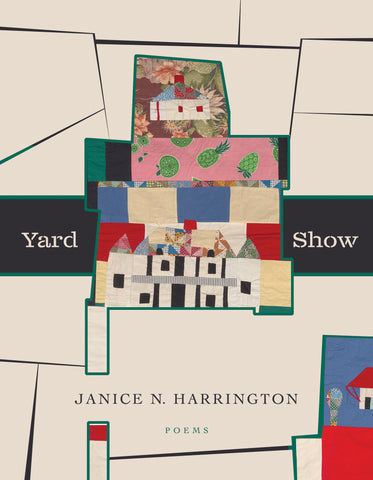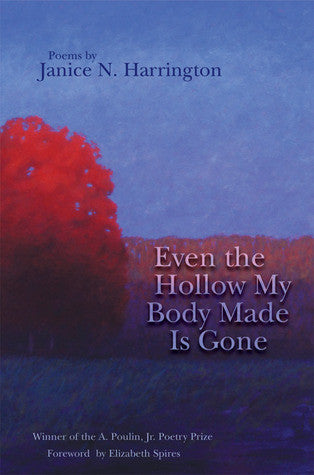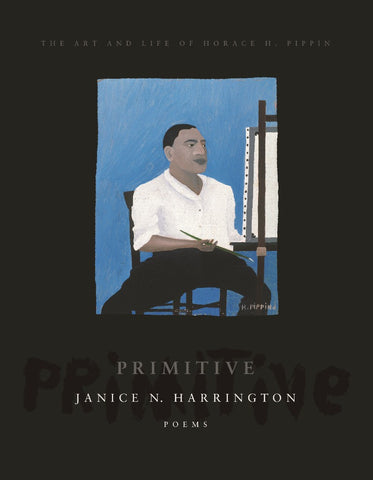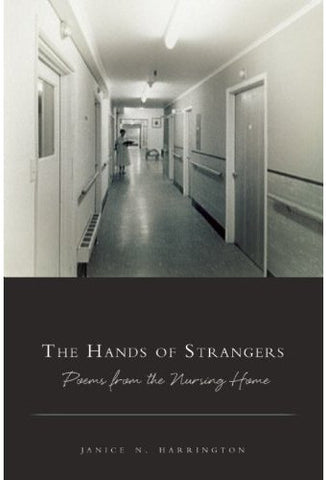
About This Title
Black history, cultural expression, and the natural world fuse in Janice N. Harrington’s Yard Show to investigate how Black Americans have shaped a sense of belonging and place within the Midwestern United States. As seen through the documentation of objects found within yard shows, this collection of descriptive, lyrical, and experimental poems speaks to the Black American Imagination in all its multiplicity.
Harrington’s speaker is a chronicler of yesterdays, using the events of the past to center and advocate for a future that celebrates pleasure and self-fulfillment within Black communities.
Praise for Yard Show
"The erudite latest from Harrington (Primitive) celebrates the yard show—a personalized, and personally significant, display of objects in one’s yard—as a microcosm for Black American expressions of place and belonging. Harrington’s poems draw on a variety of sources—from roadside signs to the words of Martin Luther King Jr.—to create a delightful poetic mélange that showcases the ingenuity of Black Americans making space for themselves. The long title poem catalogs a specific yard show, moving fluidly between the voice of the speaker and a woman whose yard reflects her efforts to define her environment, incorporating 'a red-capped gnome,' 'two ponds, three fountains,' a hand-painted plastic cherub, and 'a cast-iron kettle pinked with sedum,' among other treasures. Harrington captures the (at times) mundane and oppressive Midwest: 'I am heading to Springfield,/ through flatscapes, past variegated greens,/ the Second Amendment Burma-shaved on fence posts/ SHOOTING SPORTS/ ARE SAFE AND FUN/ THERE’S NO NEED/ TO FEAR A GUN/ while a voice on the radio predicts farm futures.' Yet possibility remains in '[a] woman’s backyard and garden.// What she’s made, with coins of sweat and constant work.' This generous volume is a memorable testament to Black creativity." —![]() Publishers Weekly, starred review
Publishers Weekly, starred review
“In this splendid collection, Janice N. Harrington pays meticulous attention as she visits and travels and ‘makes place,’ and through place reads history, constructing her own gorgeous ‘yard show’ of observations, facts, fragments, quotations, memories, and stories. Moving from a single figure to a broad sweep of what was once Midwestern prairie, she illustrates and celebrates the resilience of Black people, through whom ‘broken things’ are ‘redeemed, reused, repurposed.’ Both testimony and praise song, Yard Show is a bountiful offering.” —Martha Collins, author of Casualty Reports
“In Yard Show, Janice N. Harrington proves once again why she is one of our great American writers. Regarding Black women gardeners in particular, in the poem ‘Yard Show 1’ Harrington notes, ‘No one studied her lived aesthetic.’ But Harrington in her courageous, nuanced portraits does. She gives such women all the room they need to grow, to flourish, to spill over trellises and rail in full sun. Are these women going along, trying to fit the fulsomeness and ache of their lives into prim, acceptable parcels? No. This kind of defiance isn't for those who prefer their flowers dried and pinned, trapped in a theory of life over life itself. It takes courage to reveal hidden or denied beauty. No text reclaims and lauds that bounty of Black womanist work out of the 70's and 80's like this poetry does. Morrison of loam and prairie, Janice N. Harrington bids us to lose ourselves in the tall bluestem. To claim our place in this most American of landscapes, the grass and grain cradle. Harrington asks, "Is this restoration?" Yes it is. Righteously, unapologetically, unabashedly so.” —Vievee Francis, author of The Shared World
“In an epigraph to Yard Show, Roxane Gay theorizes that ‘There aren’t a lot of black people writing about the Midwest,’ and any reader of this collection will be glad for it. Janice N. Harrington has rendered a sweepingly intimate landscape, taking in the detail of small things as does a bird crossing the plains. The skillful leaping in these lines is astonishing and deeply concerned with interruption/disruption: ‘That shadow? It could be a spider. / It could be a brown recluse. / It could be my nappy hair.’ or ‘Scabs of linoleum atop a cement slab.’ This is the kind of poetry that teaches us to see and, in ‘If You Should Wake’ (what is certainly the most rewarding poem I have read in a decade), teaches the imagination how to renew itself.” —Dante Micheaux, author of Circus, winner of the Four Quartets Prize from the Poetry Society of America & The T. S. Eliot Foundation
Excerpt from Yard Show
BURN
The wind then, through seams of bluestem,
or switchgrass swayed by a coyote’s passing.
Where the fabric gapes, Barthes said,
lies the sensual. A prairie cut
by winding seeps, or winds or shearing wings.
Mare’s tails, mackerels, cirrus,
distance dispersed as light. Under a buzzard’s bank
and spiral the prairie folds and unfolds.
Here between the stands of bluestem, I am interruption.
I rake my fingers over culms and panicles.
Here seeds burr into my sleeves, spur each hem.
In a prairie, I am chance. I am rupture. The wind—
thief, ruffian, quick-fingered sky—snatches a kink
of my hair. The broken nap falls, wound round
like a prairie snake, a coil of barbed wire, a snare
for the unwary. In the fall, volunteer naturalists
will wrench invading roots and scour grassy densities
with fire. Wick, knot, gnarl, my kindled hair
will flare, burn, soften into ash, ash that will settle,
sieve through soil, compost for roots to suck
and worms to cast out, out into the loess that raises
redtop, turkeyfoot, sideoats grama,
and all the darkened progenies of grass
that reach and strive and shape dissent from light.
Publication Date: 10/15/2024
ISBN: 9781960145314
© BOA Editions, Ltd. 2024




